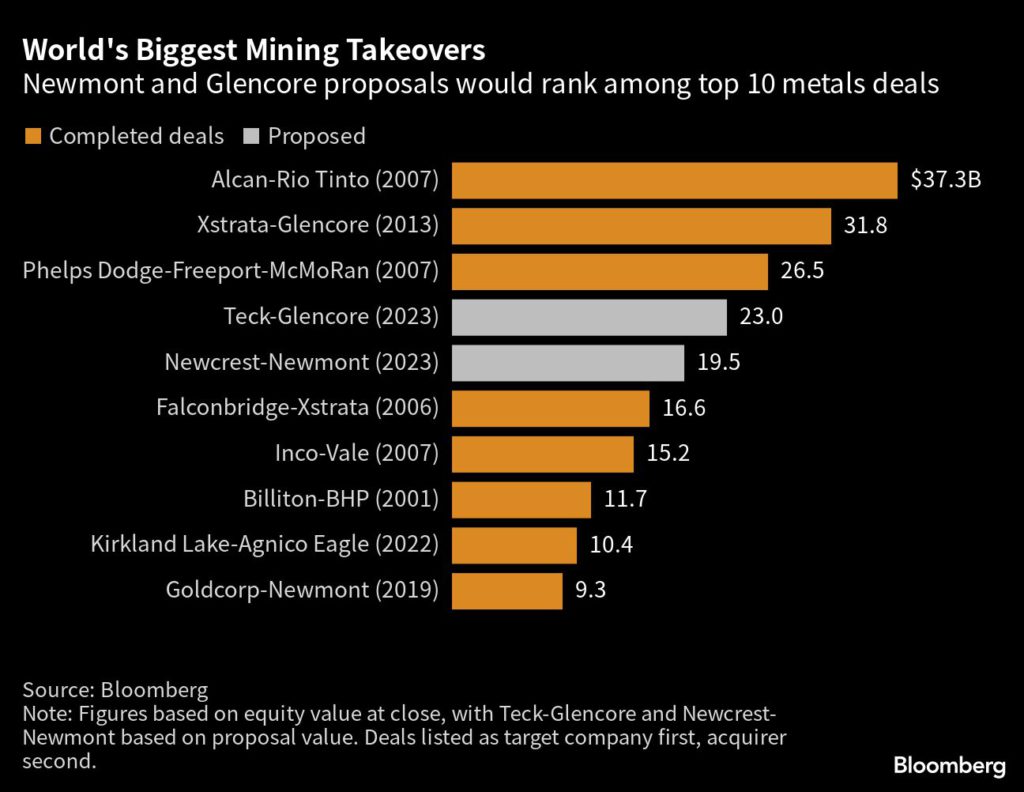Teck, Glencore CEOs converge on Toronto in battle for investors

Teck Resources Ltd. has suffered a blow to its plans to separate its coal and metals operations after a major advisory firm urged shareholders to reject the move, complicating its fight to thwart a $23 billion takeover from Glencore Plc.
The battle is heating up just as the top executives of Teck and Glencore converged on Toronto in an attempt to shore up shareholder support for their companies’ own competing visions of the future of the Canadian miner.
In the past four days, Teck has been forced onto its back foot on defending its future. The latest setback came as Institutional Shareholder Services Inc. recommended investors vote against Teck’s separation, citing “uncertainties and structural issues associated with the proposal.” The company had made a concession to accelerate its coal split to win over investors earlier Thursday, days after ramping up its rhetoric against Glencore’s bid and its management.
“Between the ISS recommendation and a higher Glencore bid likely coming, the vote really seems to be in jeopardy,” Canaccord Genuity analyst Dalton Baretto said in an interview. “I would not be surprised to see management tweak the proposal.”

Teck chief executive officer Jonathan Price and Glencore CEO Gary Nagle are making the rounds in the global mining capital, lining up competing meetings with top Teck shareholders while escalating the war of words between the rivals. Glencore’s CEO aims to use a Thursday luncheon to sway investors on its takeover proposal.
Shares of Vancouver-based Teck rose 1.8% to C$58.86 at 12:09 p.m. on the Toronto Stock Exchange, one of the world’s biggest bourses for mining companies.
Price reinforced his firm’s stand on Glencore’s latest revised offer, calling it “another non-starter” in interviews. He framed the accelerated separation of the coal business “optimal” for investors since it will create “an entirely standalone, self-funded world-class copper business.”
ISS said the separation appears “less compelling” than the company’s status quo or “alternative structures which could be sought,” according to its Thursday report. Shareholders are scheduled to vote on the plan at an April 26 meeting in Vancouver.
The battle over Teck comes as acquisition activity heats up in the mining industry, fueled by demand for more of the metals that underpin the global energy transition. Teck’s assets are appealing to several top mining companies including BHP Ltd. and Rio Tinto Group, which are said to admire the company’s copper mines in the Americas.
Glencore stepped up its pursuit of Teck with a revised proposal Tuesday that offers an $8.2 billion cash component to address investor concerns over exposure to coal assets.
Teck’s rejection of Glencore’s revised bid, which included an $8.2 billion cash component but no bump in offer premium, puts the ball back in Glencore’s court. Glencore may need to add around $2-$3 billion to its bid, in our view, just to start addressing Teck’s concerns around valuation. Even then, it’s conceivable that Teck’s board will continue to urge shareholders to vote for its own separation plan on April 26, after tweaking the transaction terms to allow for an earlier separation of the unbundled coal and metals companies.
Alon Olsha, BI metals and mining analyst, Bloomberg Intelligence
(By Jacob Lorinc, with assistance from Joe Deaux)
{{ commodity.name }}
{{ post.title }}
{{ post.date }}




2 Comments
Bob Hall
Stay the course. You are doing the right thing for a ‘Canadian’ company and it’s shareholders.
Steve Stites
TECK has two classes of common shares, A and B. The only difference in the two classes is that class A shares have 100 votes each and class B shares have 1 vote each. In the legal document that established the dual share classes it specifically states that in the event of a takeover that class B shares will receive equal compensation to class A shares.
TECK management has proposed that TECK be split into two companies. I have received a proxy statement to vote on several resolutions in an April 26 stockholders’ meeting which are designed to split TECK into a coal mining company and a copper mining company. But far more importantly from class B shareholders’ viewpoint the split would result in class A shares being worth significantly more than class B shares.
The plan to convert the class A shares to class B shares and the plan to split TECK into two companies are designed to have the class A shareholders receive more compensation per share than the class B shareholders. I urge all class B shareholders to vote against every resolution on the proxy.
If TECK management revises the terms of the split to where the class B shares would receive equal value to the class A shares then I would give serious consideration to voting for the split.
Again, I urge all class B shareholders to vote against every resolution on the proxy.